ARTICLE AD BOX

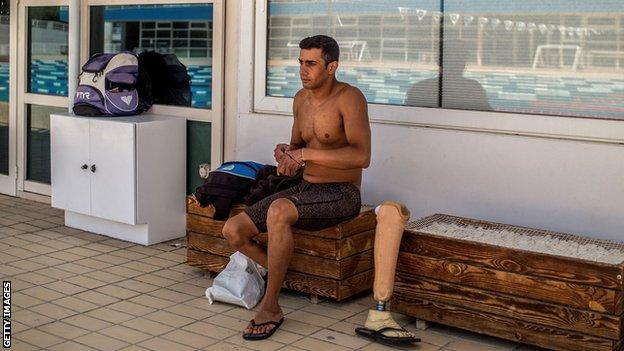 When Al Hussein arrived in Athens, he had no money and was sleeping rough
When Al Hussein arrived in Athens, he had no money and was sleeping roughIt was dark as Ibrahim Al Hussein came to. He couldn't move and thick dust filled the air, blocking out all but a few small flames flickering close by. It was hard to breathe.
The shrill high-pitched ringing he could hear was broken by another person faintly crying out nearby. Then there was his leg. Something wasn't right and he could not feel his foot.
"In that moment, I didn't know if I was dead or alive," Al Hussein says now.
Seconds earlier he had dived to the ground to protect his friend, shot by a sniper from a nearby rooftop. It was 2012 and the Syrian war had broken out in the previous year.
His family had already fled their home in Deir al-Zor on the Euphrates river, but Al Hussein felt compelled to stay. Then 23, he feared he would be forced into the army if captured and refusal would have meant certain death.
Daily life was a trauma. Bombing had destroyed much of what he loved, while water and electricity were cut and no food supplies could enter the city.
Those who remained formed a brotherhood. Some days they felt like they were "trapped in graves" but they kept a community together. They would die for one another, but hoped they would not have to.
"As the smoke cleared I could just about make out people coming towards me," Al Hussein recalls. "They had heard the tank shell detonate and carried me away to safety."
Al Hussein's lower right leg had been blown away and metal shrapnel was embedded in his nose, cheek and arm. The blast had landed just a few feet away from the spot where he had dived to protect his friend, who survived.
With all public services ceased, a dentist had formed a makeshift medical facility in a tent where he could clean wounds and administer some pain relief.
But there was no time to rest and no possibility of recuperating here. Al Hussein knew the lifesaving medical treatment he needed for his leg was simply not available in Syria.
He and some friends hatched a plan to escape. They would try to reach neighbouring Turkey, to the north, and cross by river.
"We had to go at night because we knew the Syrian army were patrolling and the Turks would have armed forces too," he recalls. "We hoped the small boat would go unnoticed."
With the help of fellow travellers, Al Hussein moved between three cities in southern Turkey as he desperately searched for the help he needed.
Most were able to apply fresh dressings for the wound, but antibiotics were in short supply, particularly when he had no money to pay for them.
"Treatment in Turkey wasn't good at all," Al Hussein says.
"One hospital gave me a prosthetic leg, but I had to carry tools with me as the screws would fall out on to the street every 100 metres.
"It also hurt when I wore it and it caused further infection because the metal materials tore through the skin and were touching the bone."
He decided to cross the country, hoping for better in Istanbul, but was left disappointed and became increasingly desperate.
"I knew that Europe was now my only option," he says. "People advised I go back to Izmir, south of the city, where smugglers could take me.
"It was scary going from square to square trying to find, and then negotiate, with smugglers."
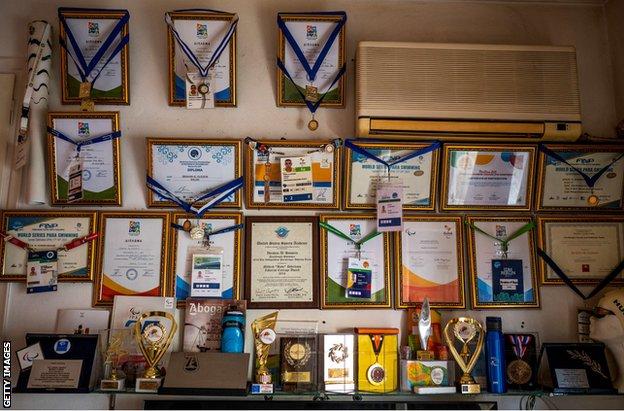 Medals and awards on Al Hussein's wall inside his Athens home
Medals and awards on Al Hussein's wall inside his Athens homeOn 27 February 2014, Al Hussein boarded a small dinghy hoping to travel the short but potentially treacherous distance across to Samos Island in Greece.
On average, more than 8,000 refugees arrive each year. Many more attempt the journey but do not make it - something Al Hussein was aware of.
"I could see the fear in the faces of the other travellers, but I had been around death since being injured in 2012 and if we sank in the middle of the sea I saw it as a faster way of dying," he says.
"Yes it was scary, but I was in 'emergency mode' for myself. I was fighting to find treatment and fighting for a better life. I knew that if I could make it, then tomorrow would be better."
Al Hussein and his fellow travellers made it to Samos and were soon rounded up by police and placed in a refugee camp. With a smile, he describes it as "the best day" of his life.
He received permission to stay in Greece for six months and Athens was his target.
"I didn't have the money, but people saw that I was half in a wheelchair and half using a walking stick," adds Al Hussein. "They were sympathetic and bought me a ferry ticket."
The travelling group were low on funds and could no longer support Al Hussein after arriving in the Greek capital. As they continued on towards northern Europe, he stayed.
"Those times were very tough," he recalls. "I had no money, couldn't speak the language and I had to live and sleep on the streets in places were the police couldn't kick us around.
"Some nights I would have no food and I would have to look for fruit in trees or eat grass from the park."
By chance he met a fellow expat in one of those city parks. The man, who had left Syria 20 years earlier, offered Al Hussein shelter for the night and arranged a meeting with a doctor, Angelos Chronopoulos, who specialised in treating people with amputated limbs.
"When the doctor saw I was in a wheelchair, he said that's not a situation he could accept," Al Hussein recalls.
"He paid more than 12,000 euros from his own pocket to have a wooden prosthetic made, for the physiotherapy that helped me learn to walk without a stick and for the medication that treated the infection. The doctor gave me everything. I was so happy."
Al Hussein could not speak Greek and took the only job available to him - cleaning the toilets at a local cafe. He worked every day of the week with no breaks during long shifts and was proud to be supporting himself.
"I was making money, which meant I could buy food, rent somewhere to stay and buy decorations for my home," he says.
"But I was missing something - sport."
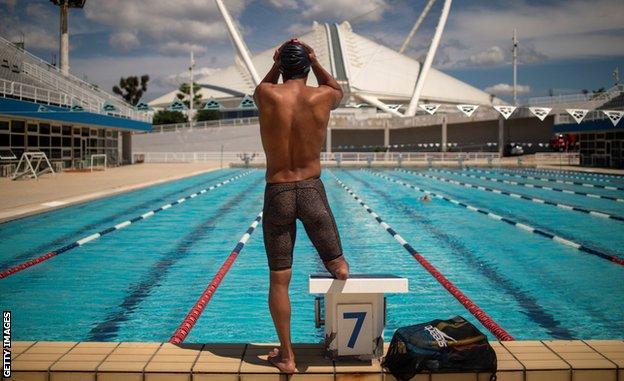 Al Hussein's dad introduced him to swimming - but he resisted at first
Al Hussein's dad introduced him to swimming - but he resisted at firstAl Hussein's introduction to swimming came via his father, a two-time Asian champion. His dad coached him as a child, although at first Al Hussein resisted his "strict" regime, preferring judo.
As war broke out in Syria in 2011, all sports facilities were forced to close, but now settled and safe in Athens, he was desperate to return to physical activity.
"I spent all my mornings trying to find sports clubs who would accept me," says Al Hussein. "I'd tell them I used to be a sportsman, but as a refugee with an injury most rejected me."
In May 2014 he found a wheelchair basketball team who would allow him to play - and 12 months later his "prayers were answered".
"A swimming club gave me permission to train at their facility. When I looked at the address I realised it was the Athens Aquatics Centre," says Al Hussein, who, at the age of 16, had watched the 2004 Olympics unfold on a small TV in his "idyllic" Syrian home.
"Seeing those Olympics gave me motivation to do sport and although it was a flashback to the past, it was also a look to a better future because I had made it to the pool I'd always dreamt of swimming in."
For much of 2015 he would swim in the morning, play wheelchair basketball in the afternoon and then work at the cafe until late in the evening. That same year he was granted refugee status and allowed to stay in Greece.
It was a gruelling regime, but it worked for him and, in early 2016, he secured two medals at the Greek Para Swimming National Championships. People began to take note.
"Local journalists began writing about how this refugee injured in the Syrian war had come to Athens and trained here," Al Hussein says.
"I wanted to tell them how important the sport had been in helping me integrate into Greek society and also mentally cope with everything I'd been going through."
A month later the United Nations and Greek Paralympic Committee - who were keen to raise awareness about the refugee situation in the country - asked Al Hussein to walk with the Olympic torch at the beginning of its journey from Athens to Rio, the 2016 host city.
He gratefully accepted and told reporters afterwards that "although it would be impossible", he would still "love" to participate in a Paralympics and "show what refugees can achieve".
Moved by his incredible journey, just 10 days later the International Paralympic Committee offered Al Hussein a place in the first 'Independent Paralympic Team' - he would go to Rio.
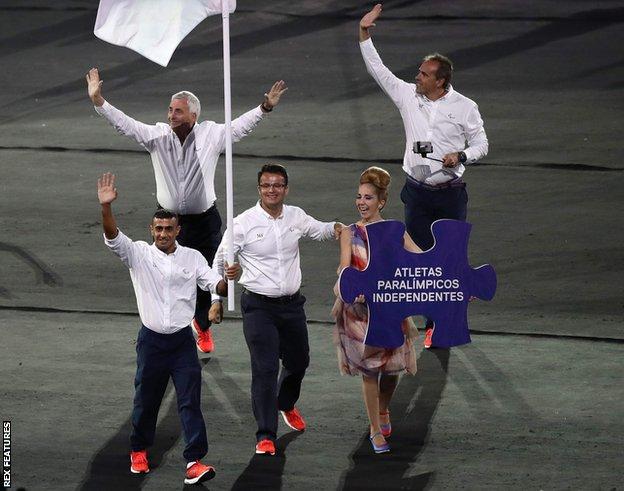 Al Hussein carries the flag of the first 'Independent Paralympic Team' at Rio 2016
Al Hussein carries the flag of the first 'Independent Paralympic Team' at Rio 2016On 7 September 2016, all was dark, just like four years earlier.
Al Hussein's chest was tight and his breathing short. Again there were muffled sounds he could not properly distinguish. Now though he stood and knew he was very much alive.
As the curtain was drawn back, Al Hussein took a deep breath, gripped the pole he was carrying and took his first steps inside Brazil's iconic Maracana Stadium.
The Paralympic opening ceremony flag bearer was hit by a 'wall of noise' as 60,000 people cheered his arrival. "This must be a dream," he whispered to himself; he had come so far.
After losing his leg in the war, paying off smugglers, fighting a life-threatening infection, living on the streets and eating grass to stay alive, now the eyes of the world were upon him.
Al Hussein was unable to challenge for a medal at Rio 2016, having only returned to the sport a year earlier. But he travelled home with the prestigious Whang Youn Dai Achievement Award - given to an athlete who "best exemplifies the spirit of the Games and inspires and excites the world".
He has trained hard in the years since, but preparations for Tokyo were badly affected by the coronavirus pandemic.
"During lockdown I couldn't go to the pool and it was a real struggle for athletes with disabilities," he says.
"It was financially difficult because I had no support, nor any competitions and my place of work was shut. But I found a way through - I always do."
Now 32, in Tokyo he will be part of another first, the six-strong Paralympic Refugee Team and he is keen to perform and spread the story he began to tell five years ago.
"Tokyo marks a significant moment for unity and hope, but my message specifically for refugees around the world is to never give up," says Al Hussein, who will compete in the 100m breaststroke heat on Thursday.
"There was a lot of suffering in my journey, but I hope people who see me or read about me realise that even if you're a refugee or become disabled, life has not stopped.
"No matter what struggles you face in your life there is still so much good you can do and so much you can achieve."
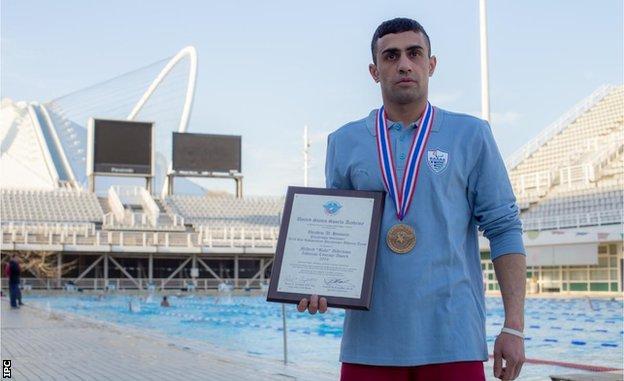 Al Hussein will be one of six athletes competing as part of the Paralympic Refugee Team in Tokyo
Al Hussein will be one of six athletes competing as part of the Paralympic Refugee Team in Tokyo
- The ultimate Jay Z playlist: An hour of music from the 23-time Grammy winner
- Bloodsport: Listen to the story of a systematic Olympics doping scandal


 3 years ago
98
3 years ago
98
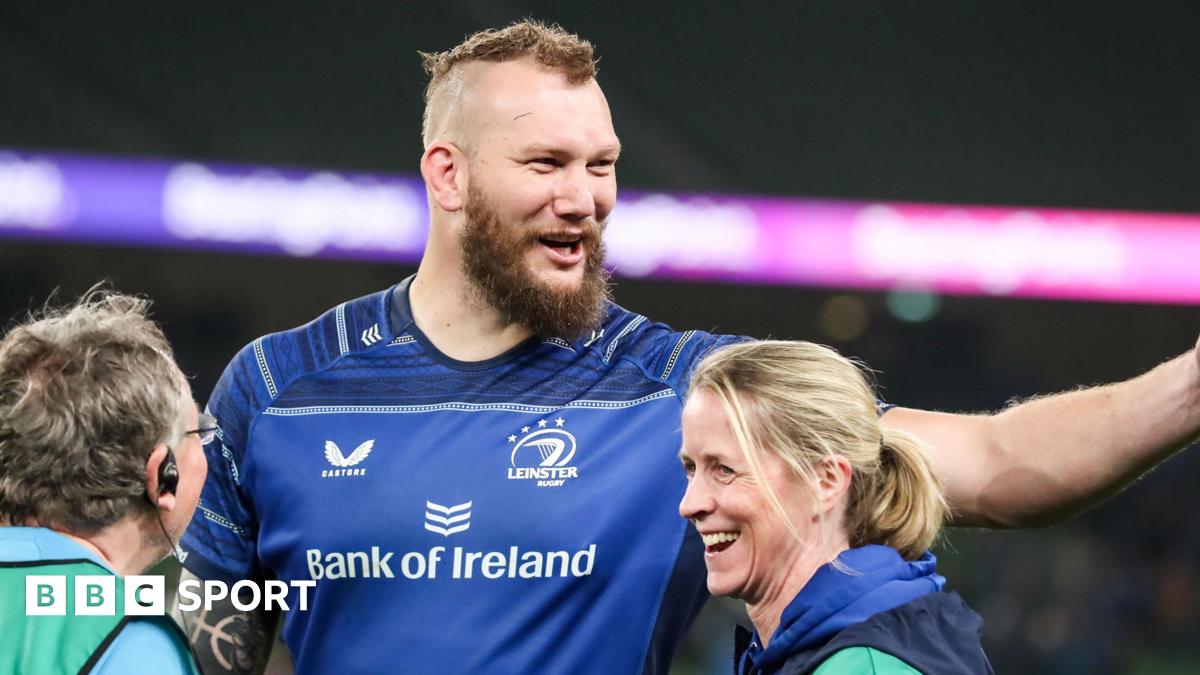
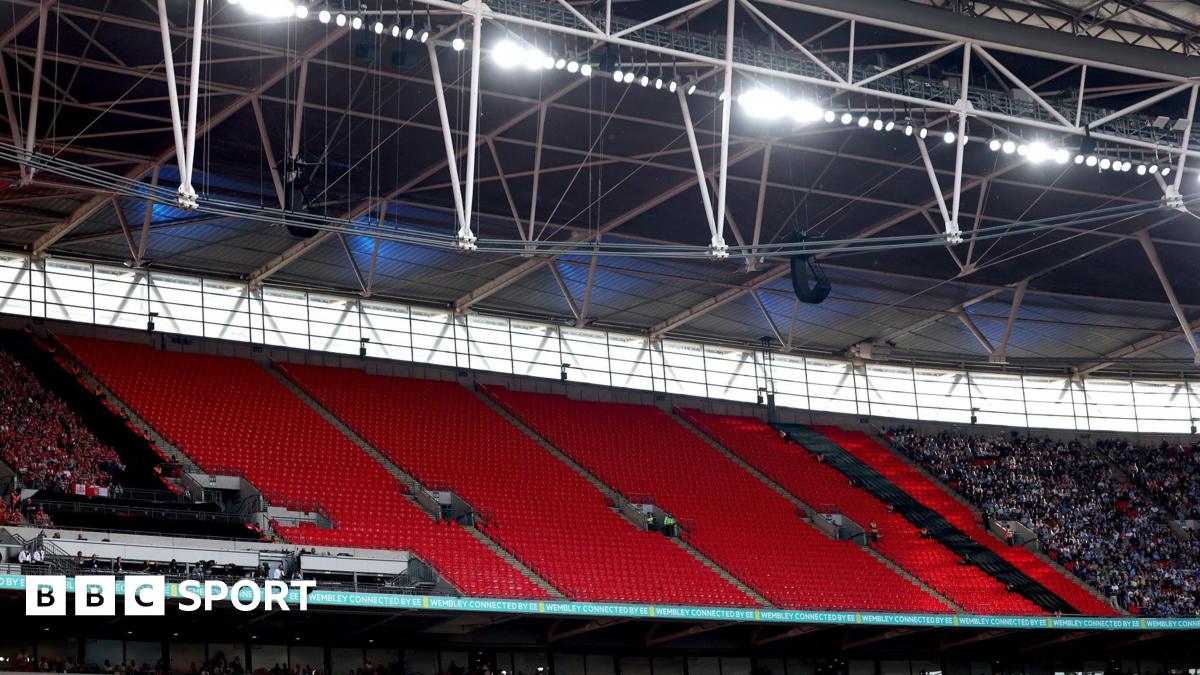
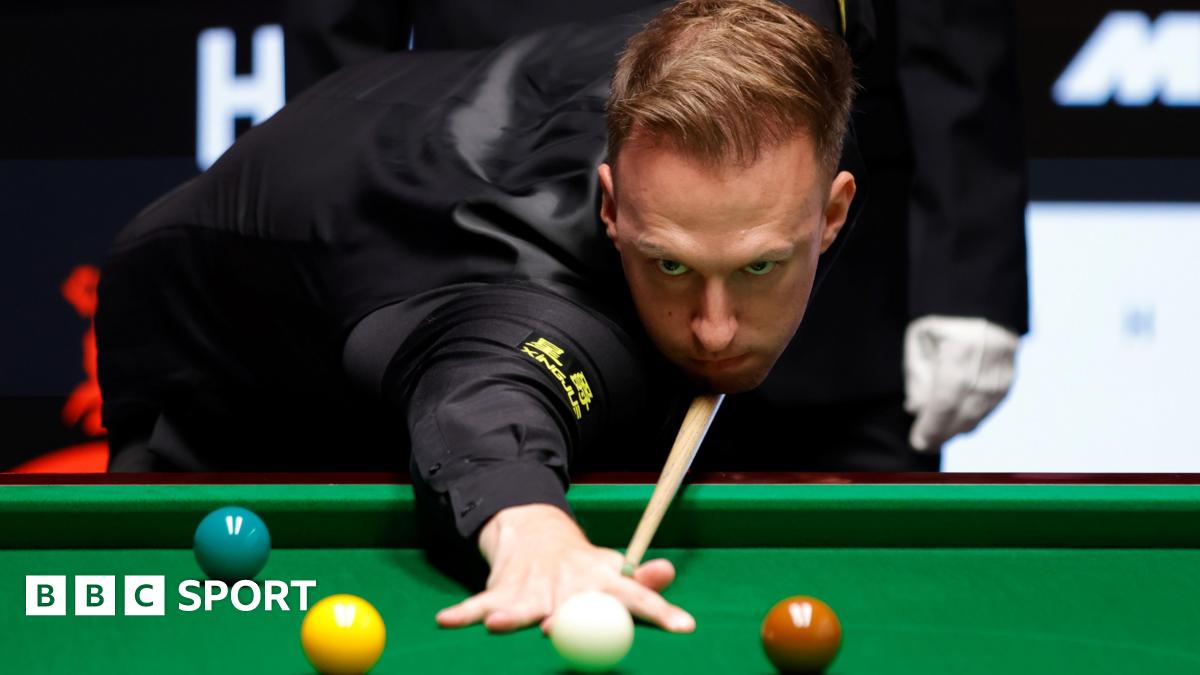





 English (US) ·
English (US) ·